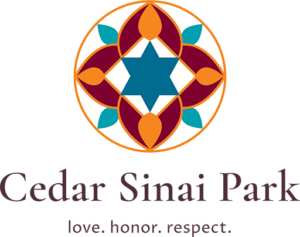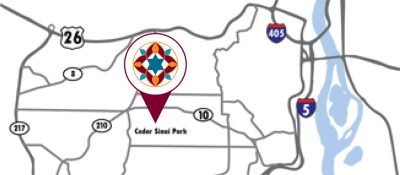Jeanine Semon: Creativity Still Flowing at 92
When Jeanine Semon’s husband, Ed, used to leave for work every morning around 7:30 a.m., he would advise her to stay off the phone until after noon.
“That’s all he’d say,” said Jeanine, with a chuckle. “He knew my high-energy painting time was nine in the morning. And then after 12:30, he knew I’d painted. And he was right.”
Ed Semon recently passed (April 25, 2022), but even while grieving, Jeanine can still feel his quiet support in her artistic endeavors.
Residents Make a Difference at Rose Schnitzer Manor
One of the beauties of residing in an assisted living community is that there are always new ideas to share and challenges for solving! Residents with decades of life experience bring their thoughts and interests to Rose Schnitzer Manor to lead activities and take lives in a new direction.
“Our residents are involved and have so much to offer,” said Life Enrichment Coordinator Fabiana Dal Cero. “Some of the new activities come about through the Resident Council,
Dignity Committee Enhancing Person-Centered Care
One aspect of creating a home life for Cedar Sinai Park residents is respecting their apartments and suites when cleaning and organizing and providing care. Ways to tackle these tasks respectfully with residents’ preferences in mind was the focus of the organization’s Dignity Committee these past weeks.
“We all need reminders to respect people’s personal spaces when we are in them and to ask first if it’s okay to move items,” said committee chair and Director of Community Life Jennifer Felberg.
Cedar Sinai Park Benefit Raises More than $500K
From skits in Marcy’s Bar to residents sharing stories of what makes Cedar Sinai Park so special, the nonprofit senior living community’s annual benefit on May 12 was full of fun and laughs.
“The expression of love was truly moving,” said Chief Executive Officer Kimberly Fuson. “Watching our community come together was inspiring.”
Board Member Felicia Rosenthal agreed: “The benefit show was so genuine and the heart was so apparent that you knew this was a community.”
Presenting sponsors included Jordan Schnitzer,
Rachael White
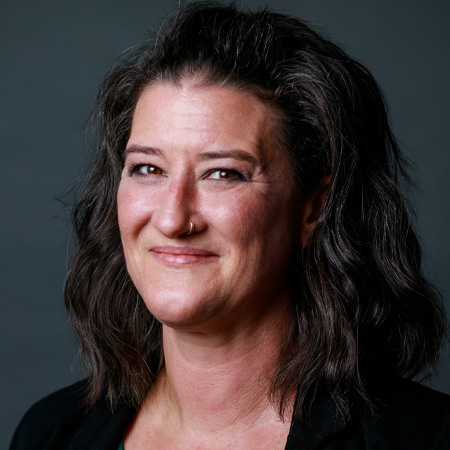
From Caregiver to Administrator
Rachael is the quintessential Cedar Sinai Park employee who embraces and models the role of a leader in our community.“Rachael is the quintessential Cedar Sinai Park employee who embraces and models the role of a leader in our community, said Chief Executive Officer Kimberly Fuson. When we consider the past two years and all of the ever-changing information that was shared about how to keep people safe and all of the confusion and uncertainty some of those changes created and then actually stepping up and volunteering to be the person in charge of ensuring all 500 of us had what we needed on a daily basis for that period of time in a very challenging time . . . all of those factors make Rachael’s service to our organization even more extraordinary, and that’s in addition to her regular role in which she always goes above and beyond. Rachael grew up in upstate New York and went right into the military after high school, stationed at the United States Naval Hospital in Okinawa, Japan, where she worked in the medical/surgical ward and intensive care unit for three years, receiving a Letter of Commendation for exceptional service. She was transferred to the United States Naval Hospital Camp Pendleton in California where she worked in intensive care, pediatrics, and the medical/surgical ward for another three years and received a Letter of Commendation for management of mass casualty. Rachael was a private caregiver in Escondido for a year providing all aspects of care to a person with a brain injury, and then worked for Fresenius Dialysis in Alabama. She bartended at the Huntsville International Airport for five years, as she worked toward as associate of science degree from Calhoun Community College, and a bachelor of science in healthcare administration from the University of Phoenix.
We think it’s our personal interactions that make Sinai In-Home Care special.She then moved to Oregon to be closer to her mother and grandmother, and worked for Signature Home Care in health and hospice for two years, and in marketing for Home Health and Hospice, before being recruited to join Cedar Sinai Park in 2017 as its director of Sinai In-Home Care. Rachael was approached by a recruiter in 2017 to apply to Cedar Sinai Park, and attended our grand re-opening. “I spent some time with the staff wandering around,” said Rachael. “And I decided I wanted to work here. I had already interviewed and it solidified the feeling of camaraderie and atmosphere that were so important to me. You don’t always get that sense of belonging and as I walked around, I decided I want to work with these people.” As Sinai In-Home Care Director, Rachael supervises a team of caregivers providing care to elders in their homes, including residents at Rose Schnitzer Manor, and the Harold Schnitzer Center for Living. Rachael recruits, onboards, and trains Cedar Sinai Park caregivers, and then carefully matches caregivers with elders to help with whatever is needed: tasks such as laundry, medications, bathing and grooming, light housework, errands, field trips, playing games, etc. One current caregiver is helping a client write a book. “We think it’s our personal interactions that make Sinai In-Home Care special,” said Rachael. “We really think about the connections and what will make for a good fit when matching caregivers with our elders. It’s the most heartwarming part when you can make that connection and both parties are happy, which makes you feel really good. It’s a beautiful thing when it works well, because many folks want to stay in their home and be as independent as possible, and we can help with those moments that make their goal a reality.
. . . many folks want to stay in their home and be as independent as possible, and we can help with those moments that make their goal a reality.“I want my caregivers taken care of so they can give good care,” said Rachael. “I think that’s what makes us different. We take time to get to know our staff so they feel supported and know we’re looking out for them. The majority have been with us almost two years or more now, which has been great through the pandemic and not what other in-home providers have experienced.” Determined and persistent, Rachael has also been known to make home visits when other caregivers aren’t available, especially for emergencies and hospice, and loves attending to those in the community. “We always step out of our usual roles and get to people, just like what we would do for a parent or grandparent that suddenly needed help,” she said. “Whatever it takes, we’re going to do it.” Racheal is so committed to her staff that she makes herself available 24/7. For example, when a client has cognitive impairment and is being challenging and one of her caregivers needs a break, Rachael has been known to go in the middle of the night to ensure her caregiver is comfortable, while maintaining the client’s dignity, care, and safety. “It is a lot of troubleshooting and creative thinking,” she said. “I drop everything and go.” During the pandemic, Rachael worked hard to maintain connections with caregivers who were suddenly working remotely. Rachael quickly pivoted to phone calls with her caregiving staff, working one on one with each to share assignments and get them what they needed for their client visits. She often drove to her clients’ homes to distribute equipment—like gloves and masks—and train them on the latest Covid protocols. Caregivers not only had to be carefully matched with seniors, but with Covid, they had to be assigned their seniors with no switching to ensure a consistent and safe bubble. Many seniors did not understand what the pandemic meant and so caregivers also had to be ready to educate elders on why they were wearing a mask and ensure protocols were followed.
All of the changes kept the teamwork and partnership going. We still saw each other’s faces and we were able to check in even as we were dropping items off on porches to ensure we stayed connected.Rachael created an online caregiver training during the pandemic, and then recently switched it up again to an in-person, hands on training. “For us, again, it’s the personal connection. We want to support the relationship and team feeling right off the bat, so they have the skills and tools to be prepared, whatever happens, when they’re out caring for seniors.” Rachael also spends a great amount of time mentoring caregivers so they can achieve their professional goals. “I always tell my staff: I want you to come on board with Sinai and stay for a year or two. But if you want to do something different, it’s my job to find ways to build you up, so you can meet your professional goals. Hopefully, they stay and develop those goals here at Cedar Sinai Park.” Heather Hess is a great example of a caregiver who has grown professionally at Cedar Sinai Park, thanks to Rachael’s guidance. “If you want to learn and grow, Rachael supports you; she always has your back,” said Heather, who recently became one of the Portland-area’s only Positive Approach to Care-Certified Trainers, thanks to Rachael’s encouragement. “Rachael will lay out the map and you just have to follow it,” she said. “I wanted to be more prepared for the influx of dementia clients over the next 10 years. I followed Rachael’s plan and became certified and two of our caregivers followed suit. One is working toward a nursing degree; the other toward her certified nursing assistant degree. If I have learned one thing from Rachael is that the world is your oyster and you choose how you grow your pearl. It’s very rare that you have a boss that truly cares about her team. This is why I have stayed in my current position and grew. I hope to be a great leader like her one day.” In addition to creating an environment in which people want to work, Rachael is integral in recruiting and has been instrumental in hiring events, job fairs, and other outreach.
I try to model that we are a team and set a good example of how we care for one another. I think I am good at helping to keep tasks positive, and always make time to be a sounding board for others.She also volunteers at Cedar Sinai Park events: Barbecues and New Year’s Eve, and Good Deeds’ Day, along with her daughter and sometimes her mother. She picks up trash, if needed, as she walks the campus, helps serve in the dining room, and learned human resources’ onboarding process to support their team. Recently, a caregiver moving a resident into a new room needed help and Rachael grabbed her staff to help so the move went more quickly and efficiently. “Some days the office is a very busy place,” said Rachael. “I try to model that we are a team and set a good example of how we care for one another. I think I am good at helping to keep tasks positive, and always make time to be a sounding board for others.” For more information about Sinai In-Home Care, please call (503) 595-7388.
Cedar Sinai Park’s Annual Meeting is June 9
Mark your calendar for Cedar Sinai Park’s 102nd Annual Meeting on Thursday, June 9, at 7 p.m., for members (all donors since July 1, 2021) and the board.
Arthur Ginsburg
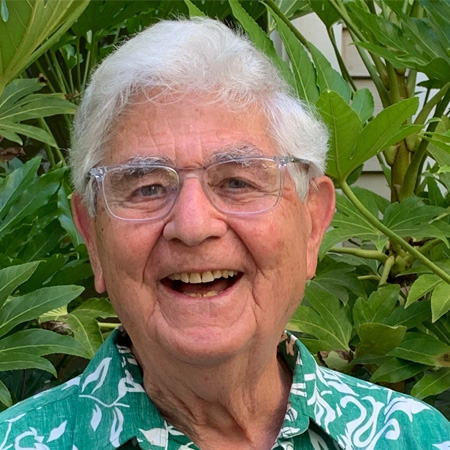
Catch Me if you Can
You walk in the door here and it looks like a home,” he said. “It’s got pictures on the walls and carpets and statuary and a very friendly staff. I have a lovely apartment with a view of the forest. It feels like a home.Arthur grew up in Philadelphia and attended Temple University right after WWII, graduating in 1950 with a bachelor of arts in radio and theater. There, he met 17-year-old Judith Goodman, a talented pianist. “I had a wonderful education and was very active in school,” he said. “I did all kinds of stuff, like acting.” Arthur was an on-air personality in South Carolina during college, did summer stock on Cape Cod, toured with a children’s theater, and was on a soap opera. He was also assistant director at WCAU-TV after college. “But it was sporadic,” he said. “It wasn’t enough. And one day I came home and my wife, who was 19 at the time, looked at me and said in Yiddish ‘we are not making a living.’ She was working, and teaching and times were a little tough.” Twenty-two-year-old Arthur returned to school, and like his father before him, graduated from Temple’s Beasley School of Law. “I went through law school in two-and-a-half years by going summers, as well as during the week, and worked weekends and nights in radio spinning records,” he said. Right after passing the bar, Arthur was drafted into the Korean War. Thanks to his law background, Arthur was assigned a detailed research and investigations role in the United States Army’s Counter Intelligence Corps as a plainclothes agent. Son, Claude, arrived in 1954. After the war, Arthur said he “got restless” and moved to Washington, D.C., obtaining a job as an administrative lawyer in the United States Department of Labor in the Office of the Solicitor interpreting labor laws for five years. “I worked on workers’ compensation cases, defending the government against insurance claims,” he said. Son, Ian, was born in 1959.
I thought, maybe there is something else I’d like to do, something different.Looking for change again, Arthur then turned to the Federal Communications Commission and was hired immediately. This was 1961. He stayed for 26 years handling complaints and communications enforcement law compliance, working his way up to become the division chief. His tenure overlapped with many quiz show scandals, false promotions, and hoaxes, as well as equal time election laws. “This was the really early days of television,” said Arthur. “Any time a congressperson got a complaint about something people heard or didn’t like on the radio I was one of the guys to handle it, or I’d send out one of my crew to investigate, anywhere in the country. It was very difficult, very active, but a wonderful job and I loved Washington and we traveled a lot.” Then one day, Arthur said he looked out the window and decided he was “middle aged.” Said Arthur: “I thought, maybe there is something else I’d like to do, something different.” That something was teaching journalism at the University of Texas in Austin. Judith, who had been teaching all those years, was hired as a part-time chamber music coach. “The first day I went into class was the first day I ever taught,” said Arthur. “Nobody ever teaches a college professor to teach.” Arthur taught and organized seminars on first amendment law and freedom of speech. “We would bring circuit court judges down and the top journalists in the country. Mrs. Lady Bird Johnson would come and sit in the front row. And she invited me to her famous home on the Pedernales River near Austin one evening with all the people in the seminar for a beautiful sit-down dinner with waiters in white gloves. President Lyndon Johnson had died seven years previously. And she gave me a tour of the house and his desk that she had preserved. It was interesting and very lovely.” Arthurs’ contract at the University of Texas was up after two years, the United States was in a depression, and then oil prices plummeted. The Ginsburg’s moved to Sedona, with Arthur teaching at Northern Arizona University in Flagstaff, and Judith creating a chamber music festival. They built a beautiful home with views of the red rock mountain formations. Arthur was also hired to write a newspaper column, and develop short, on-air editorials for the local television station.
One of the ways to survive is to live in the present, I miss my wife every day. But this is now and this is here, and I have things to do and things I want to do. I really like it here.In 1994, his final year in Arizona, Arthur was a visiting professor at Northeastern University in Boston, enjoying the culture available. Arthur and Judith had spent many a summer at Reed College attending their chamber music festivals. In 1995, they moved to Portland for good with Arthur teaching graduate seminars in media law at the now-defunct Marylhurst College. He and Judith biked a lot, taking their fold-up bikes to Seaside for the day. They lived in southeast Portland off Clinton Street and liked to hike and sail. Besides the flute which he’s been studying since he was 15, tai chi, reading voraciously, walking the grounds, and leading the Book Club and Food Committee and being vice president of the Resident Council, Arthur says he enjoys meeting new people.” “I go out to eat a lot and to the ballet and I like to travel with friends,” he said. Arthur is an avid biker, and despite a recent spill on a sharp corner from which he is still healing, Arthur just bought a new bike helmet and gloves and an air pump and is “ready for a new season” of cycling. A Rose Schnitzer Manor ad a year ago featured a photo of the young-at-heart Arthur geared up, smiling, and ready to ride. “One of the ways to survive is to live in the present,” said Arthur. “I miss my wife every day. But this is now and this is here, and I have things to do and things I want to do. I really like it here.”
Join us for Cedar Sinai Park’s annual benefit on Thursday, May 12
Join us for Cedar Sinai Park’s annual benefit on Thursday, May 12! This is a great opportunity to support the residents who live in or access one of Cedar Sinai Park’s short or long-term care offerings. Staff, residents, families, donors, volunteers, and community members are all invited. Our event is virtual with the pre-show at 5 p.m.
All are welcome to join the fun. Go to: avstream.me/MarcysBar
Eddie Younger
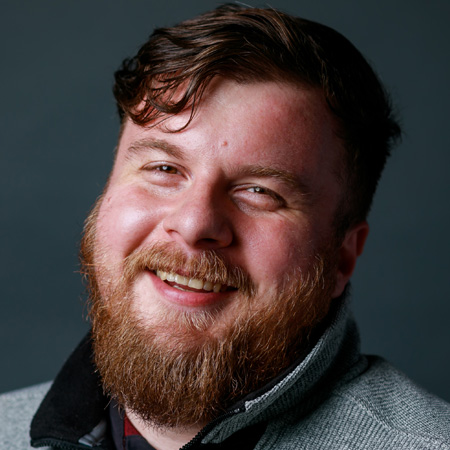
From Passwords to Problem Solving
It all happened at a very good time in my life, because I had done four years of school, but knew I was done with school. This career happened at an opportune time.Eddie became information technology manager in 2018. He provides full support to team members at Rose Schnitzer Manor, Sinai In-Home Care, Adult Day Services, Kehillah, Robison Jewish Health Center, and Harold Schnitzer Center for Living—about 245 employees—and light support to residents. During the pandemic, with people using technology so much more, Eddie’s outside-of-the-normal-workday responsibilities increased. “Because of Eddie’s heart, expertise, and rapid response, residents and families were connected really quickly at the beginning of the pandemic, and many 1:1 life enrichment programs for residents during the pandemic were provided through technology when we were in quarantine. Eddie’s creativity, quick, concise thinking, and dedication made it happen,” said Cedar Sinai Park Chief Executive Officer Kimberly Fuson. “And with many of our employees suddenly working remotely due to Covid-19 health guidelines, Eddie had to help our team members with reliable access to technology from their own homes. I know that Eddie was working around the clock to provide support whenever it was needed, especially in 2020.” Eddie worked at home for two weeks at the start of the pandemic but missed the activity on campus and the ability to work closely with the staff and residents so moved back to campus early on. A typical day has him making 20 trips back and forth along Boundary Street between buildings. “It was more efficient to help people troubleshoot their computers with me on campus,” he said. “So, I went back to the office.”
My favorite thing is to find inefficiencies in people’s workflow and create solutions to make their day.Eddie is continually assisting residents—from setting up Kindles to phones to computers. He rebuilt the computer lab that is available to residents in Rose Schnitzer Manor so there is always working technology accessible to our seniors. Eddie has also helped the human resources team with their technology needs, said Human Resources Director Geneva Dougal. “Eddie understands the challenges and viewpoints of the different departments and role of the entire organization in a way that few people on campus can do. He uses his understanding to work well with each department and create win-win solutions. Plus, he is just a nice guy.” A snowstorm in late December 2021 left many caregivers who lived in the hills struggling to get to work. Eddie set up a call system to make it easier than previous years for both dispatchers and caregivers to connect for rides. Eddie’s system relied upon an auto transfer to the relevant people, so caregivers only had to call one phone number, which greatly improved efforts behind dispatching rides to get them to Cedar Sinai Park. And Eddie didn’t just manage the technology. Once the dozens of calls from caregivers began coming in, he hopped in the Cedar Sinai van to pick people up, delivering them to work, and then taking them home at the end of their shift. Gaming as a small boy growing up in Portland pushed Eddie towards tech, but it was the motivation to customize his Android phone that really ignited his passion. While at Beaverton High School, Eddie’s parents said he couldn’t have a phone until he was able to pay for it himself. “So, I started working at Cedar Sinai Park,” said Eddie. “And I learned how to hack my phone so I could do tricks with it, and then I wanted to do that with other stuff. My interest cascaded from there. “My favorite thing is to find inefficiencies in people’s workflow and create solutions to make their day,” said Eddie. “If I can find a solution to make their everyday better, they’re happier, and then we can provide better service to our residents. Whether it’s a small task like creating an Excel spreadsheet to auto-calculate, or a big one like automating entire workflows, I like to help people be happier.” Recently, Eddie has taken on several projects of his own accord just because he knows what it’s like to walk in others’ shoes and he wants to boost efficiencies. One success includes creating a computer application that allows the front desk upstairs in Rose Schnitzer Manor to better communicate with the kitchen downstairs regarding “to go” orders received from residents. And Eddie is in the process of building, from scratch, a kiosk for servers to send food orders directly to the kitchen so they can stay in the dining room and attend to residents’ needs while the food is prepared.
I believe in our mission of helping the community, and I feel like I can make positive changes here.“We have two kitchens at Rose Schnitzer Manor because we are kosher and they are both huge,” said Eddie. “Anything we can do to reduce those steps for servers can only be a good thing.” Having been a server, Eddie knows exactly what he is talking about and hopes to improve the dining experience for residents, and the work environment for servers. Eddie also recently immersed himself into the process of hiring new employees. He worked with our human resources team to examine the long onboarding checklist required when we are bringing people into the fold as employees and determined that some of the requirements could be done online. Eddie worked directly with our representatives at Paylocity to learn how their program could work better for Cedar Sinai Park. He created systems so that much of the new hire paperwork could be tackled by DocuSign. And he initiated a project management system online that breaks down, into key steps, what new hires need to do to come on board and be part of the Cedar Sinai Park team. “I often hear, “you just walked up and pushed a button, and that’s so frustrating for me!”,” said Eddie. “My reply is that people are offloading their information technology knowledge to me, just like I am offloading my knowledge about their areas of expertise to them. That’s generally how I view the way we all serve one another.” A big outdoorsman—try to catch Eddie with a coat on!— he loves camping, fishing, disc golf, and overlanding in his truck.
Fran Gardner
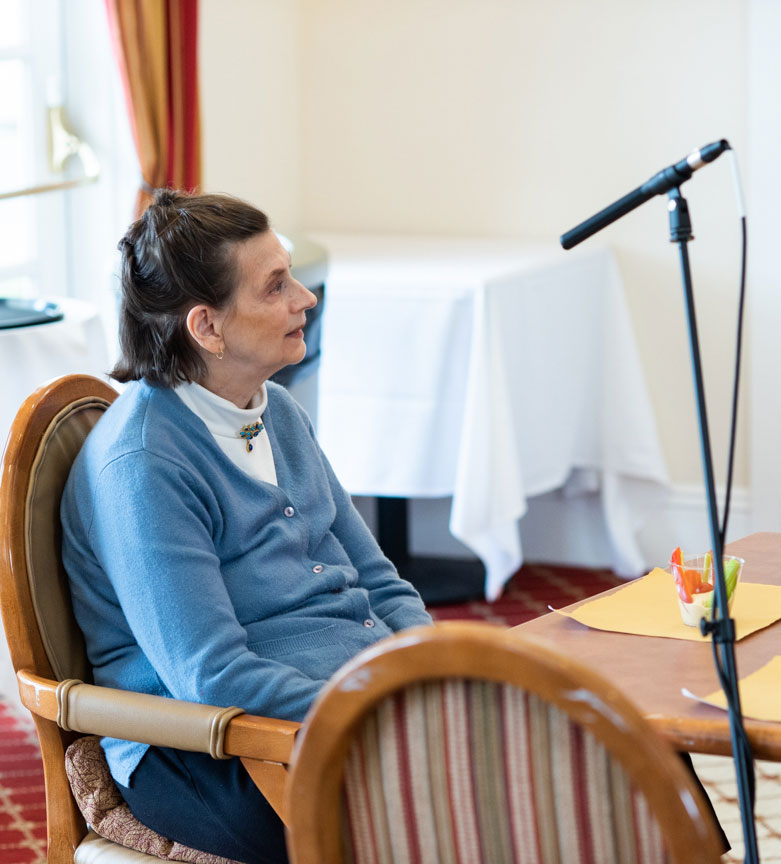
Lifetime Love of Books Leads Rose Schnitzer Resident to Create New Library System
This is a deep collection, there’s a lot of really good literature. I get comments from people that you can always find something to read here.“You have done such a beautiful job!” says a resident, passing through the library as Gardner is sharing the progress of her work. “Thank you,” says Gardner with her trademark self-deprecation and directness. “You know, it’s all done except for I’m adding new books and trying to keep the ones straightened up that are here. I need help with straightening up because it’s hard for me to do. You need to move the books to the front of the shelf, and even them so they don’t push back against the back of the shelf where they can’t be reached.” The business of library-ing has long been in Gardner’s blood. When she was 12, living in Bloomington, Minnesota, Gardner would show up unannounced at the library of her own accord, volunteering to reshelve books. At 14, in Sioux Falls, South Dakota, when she wasn’t allowed access to the adult library books, Gardner’s mother passed along her own library card so young Fran could check out books, to the amusement of the librarians. During her undergraduate years at the University of California, Berkeley, Gardner worked in the Undergraduate, Music and Math-Stat libraries as she was pursuing a bachelor’s degree in English with an emphasis on Victorian literature. “If I had not gotten a job with my local paper in Tulare, California as a Saturday proofreader when I was in high school, I probably would have pursued library science in college,” said Gardner. “I knew a lot about the library.”
This is a very interesting and diverse group of people who are intellectually curious well into their 90s.What’s Gardner’s favorite book? “My favorite is whatever I’m reading now, which is God and the Big Bang. It’s absolutely life-changing. “My current favorite author is a young adult writer named Maggie Stiefvater. She’s so wonderful, I can only read a few pages at a time. Every couple of years, I reread Pattern Recognition by William Gibson. Don’t know why. And the Harry Potters of my childhood were the Narnia series by C.S. Lewis. I was so in love with those books. I remember being surprised in junior high to discover they were allegories. I just read them for the plot.” Gardner, whose maiden name was Pollak, met her first husband, Mark Gardner, working on Berkeley’s The Daily Californian. The two moved to Medford, where Fran Gardner was a reporter for the Ashland Daily Tidings, and then to Portland where she worked at a suburban paper before being hired at The Oregonian. Gardner was an editor, copy editor, reporter and opinion writer at the The Oregonian for 34 years, retiring in 2008 during one of the paper’s numerous buy-outs. She and Mark had two daughters, Lyza Danger Gardner, a programmer who lives in rural Vermont, and Maggie Gardner, who is a professor at Cornell Law School. Fran Gardner has two grandchildren. An early adopter of the Internet, Gardner became interested in computer programming in the early 1980s, and that interest paved the way for the kind of technical prowess needed for library cataloging, which she completed on a free Internet site called librarything.com. In 2004, Gardner married Robert Jaffe, a retired professor of both philosophy and electrical engineering, and the couple lived in southeast Portland. Health troubles (she has a diagnosis of multiple sclerosis) led Gardner to assisted living near her home that she said provided no stimulation with a “library” of about 15 books and no lectures or music. Just before the pandemic, Gardner moved to Rose Schnitzer and took a ground floor room with a view of a giant cedar. “When I originally saw the space,” said Gardner, “I thought nobody would ever take that place because it’s so dark because of the big old cedar. I love that cedar and it called to me and told me I was going to live there. So I do. “This is a very interesting and diverse group of people who are intellectually curious well into their 90s,” she said of RSM’s residents. “My husband is Jewish, but I am not, and about one-quarter of the people here are not Jewish, and we all get along just fine. I like kosher food because I appreciate the humane slaughter of animals, so that was a plus for me--and I don’t miss bacon,” she said with a laugh. “The place is well constructed with a brilliant layout. The grounds and the greenery and the nature path are marvelous.” Gardner is a leader in the community. She chairs the Resident Council and sits on the board of Cedar Sinai Park. She writes frequently for Cedar Sinai’s “Our Stories” feature series. She is on the Rose Schnitzer Manor Food Committee and Cedar Sinai Park’s Development Committee. And then there’s the library. “I have a rich life,” said Gardner. “I quilt a lot and do a lot of handwork including knitting and embroidery. I play the violin. I like to sit and meditate. I am busy in so many different ways than before. And of course, I read.”
